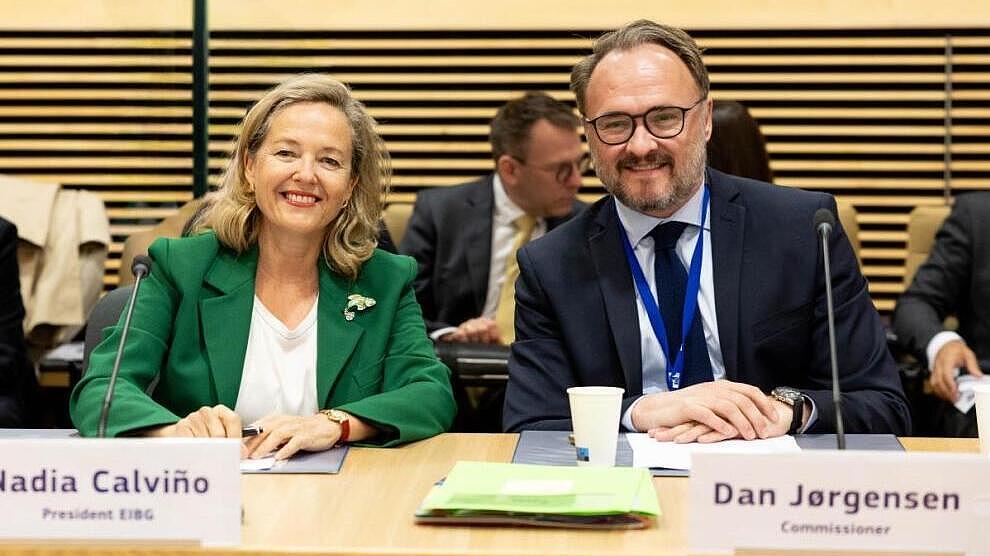 Finance & Economics
Finance & EconomicsFinance & Economics
Está a ser dado mais apoio às PME na Europa para se tornarem mais eficientes do ponto de vista energético
O Grupo Banco Europeu de Investimento (BEI), com o apoio da Comissão Europeia, apresentou uma iniciativa de financiamento de 17,5 mil milhões de euros para ajudar mais de 350 000 PME em toda a Europa a melhorar a eficiência energética. A iniciativa, anunciada pelo Comissário Europeu para a Energia e Habitação, Dan Jørgensen, e pela Presidente do Grupo BEI, Nadia Calviño, tem como objetivo mobilizar mais de 65 mil milhões de euros em investimentos até 2027 para colmatar as lacunas de eficiência energética no mercado. O relatório que acompanha o anúncio salienta que as empresas europeias investem menos em eficiência energética em comparação com as suas congéneres norte-americanas, apesar dos custos energéticos mais elevados, mas estão a tomar medidas para investir em medidas de poupança de energia. O novo financiamento do BEI integrará instrumentos de dívida e de capital próprio, quase duplicando os actuais níveis de apoio para o período 2025-2027, a fim de facilitar a eficiência energética e a descarbonização das PME. Será criado um balcão único para a eficiência energética, a fim de simplificar o acesso e o apoio, integrando toda a oferta de empréstimos intermediados do Grupo BEI. A iniciativa será reforçada por garantias orçamentais da UE através do InvestEU e do programa ambiental LIFE. Está também a ser lançado um grupo de trabalho específico para as PME no âmbito da Coligação Europeia para o Financiamento da Eficiência Energética, com o objetivo de eliminar os obstáculos e desenvolver soluções de financiamento adaptadas às PME. O BEI apoiará plataformas de investimento específicas que trabalham com parceiros privados para financiar projectos de eficiência energética de PME, atraindo capital para o ecossistema de eficiência energética da Europa. Esta iniciativa está em consonância com os objectivos da UE definidos no Pacto Industrial Limpo e no Plano de Ação para uma Energia Acessível.
Leer Artigo completoComo o investimento global em energia se transformou de 2019 a 2025
De 2019 a 2025, o investimento global em energia mudou drasticamente para as energias limpas, com os investimentos a duplicarem e a ultrapassarem os combustíveis fósseis. A energia solar, impulsionada pela descida dos custos e pelos avanços tecnológicos, tornou-se o maior segmento de investimento. No entanto, embora o investimento em energias renováveis esteja alinhado com os objectivos climáticos, os investimentos na rede ficaram para trás, criando estrangulamentos. Surpreendentemente, os centros de dados de IA aumentaram a procura de energia de base fiável, reavivando o interesse pela energia nuclear e pelo gás. A energia solar distribuída cresceu nos mercados emergentes independentemente da política, remodelando a dinâmica económica, mas a implantação de energia limpa permaneceu desigual a nível global.
Leer Artigo completoValor comercial através da simbiose industrial
Um novo quadro avalia a simbiose industrial, mostrando poupanças de custos, aumento de receitas, redução de riscos e benefícios intangíveis, defendendo parcerias estratégicas e navegação regulamentar para uma vantagem sustentável a longo prazo.
Leer Artigo completoSimbiose Industrial: Uma Abordagem Transformativa para a Indústria Sustentável
O relatório CORALIS sobre simbiose industrial (SI) destaca os seus benefícios, como a redução das emissões de CO2 e dos resíduos através da colaboração intersectorial. Casos de sucesso e plataformas digitais facilitam a SI, mas os desafios de adoção persistem. As futuras políticas em matéria de SI poderão promover a sustentabilidade e criar emprego em novos sectores.
Leer Artigo completoLibertar o potencial da simbiose industrial: Estratégias para o desenvolvimento de projectos sustentáveis
As diretrizes CORALIS abordam o financiamento e a mitigação de riscos para projectos de Simbiose Industrial (SI), oferecendo um processo estruturado para melhorar as relações entre as partes interessadas, alinhar-se com os quadros regulamentares e melhorar a implementação de projectos para operações industriais sustentáveis.
Leer Artigo completoDesbloquear o valor da simbiose industrial: Um guia completo sobre preços e valor comercial
O artigo descreve abordagens e um quadro para a fixação de preços na simbiose industrial, salientando mecanismos justos e sustentáveis, tendo em conta os custos, os ganhos, os riscos e o valor para além da economia para economias circulares bem sucedidas.
Leer Artigo completoRevitalizar o futuro industrial da Europa: A visão estratégica da Comissão Europeia para 2024-2029
A estratégia da Comissão Europeia para 2024-2029 visa revitalizar o sector industrial da Europa, enfrentar os desafios económicos, promover a sustentabilidade, fazer avançar a soberania tecnológica, garantir a justiça social e reforçar as parcerias globais para um futuro resiliente e próspero da UE.
Leer Artigo completoRevolutionizing Pump Systems: The Power of Life Cycle Cost Analysis
Pumping systems represent significant energy and cost usage in industrial operations. Implementing thorough Life Cycle Cost (LCC) analysis can yield major savings by encompassing all ownership costs from initial purchase to decommissioning. Proper design, avoiding oversizing, and maintenance are crucial strategies.
Leer Artigo completoBoosting the Hydrogen Revolution: The Role of a European Hydrogen Bank
The EU aims to produce and import 20 million tonnes of renewable hydrogen by 2030 to achieve climate targets. The European Hydrogen Bank, integral to REPowerEU, supports this via subsidies and market integration. Investments in hydrogen technologies foster innovation, job creation, and international cooperation, enhancing energy security and global leadership in clean energy transitions.
Leer Artigo completoThe Strategic Landscape of AI Infrastructure Financing: Microsoft, BlackRock, and Global Initiatives
The Global AI Infrastructure Investment Partnership, with $30 billion from Microsoft, BlackRock, and others, aims to build AI data centers and related energy infrastructure, addressing the high energy demands of AI. Other initiatives like Google's AI Opportunity Fund and IndiaAI Mission support AI infrastructure development, focusing on sustainability and international cooperation to ensure global economic and technological advancement.
Leer Artigo completo








